2021-2022学年人教版英语中考复习之七年级下册 Units 1~4课件(共123张PPT)
文档属性
| 名称 | 2021-2022学年人教版英语中考复习之七年级下册 Units 1~4课件(共123张PPT) | 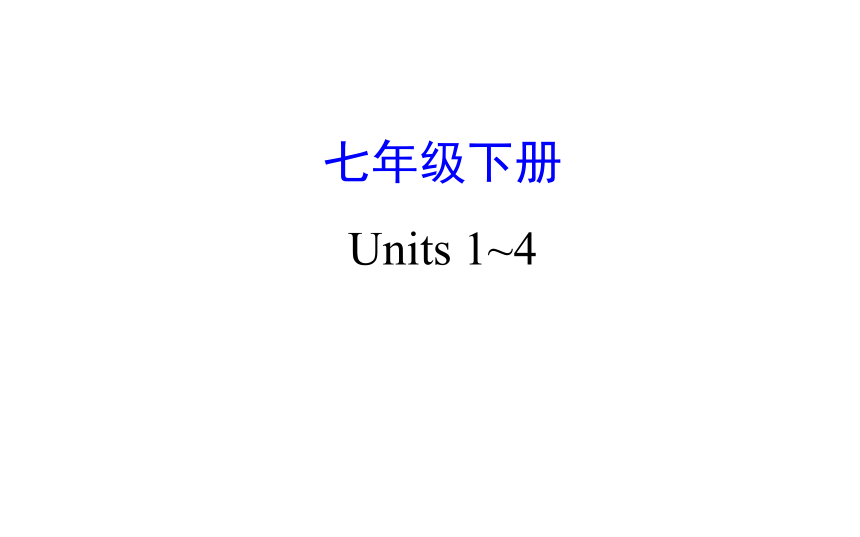 | |
| 格式 | ppt | ||
| 文件大小 | 2.0MB | ||
| 资源类型 | 教案 | ||
| 版本资源 | 人教新目标(Go for it)版 | ||
| 科目 | 英语 | ||
| 更新时间 | 2021-07-28 16:38:21 | ||
图片预览

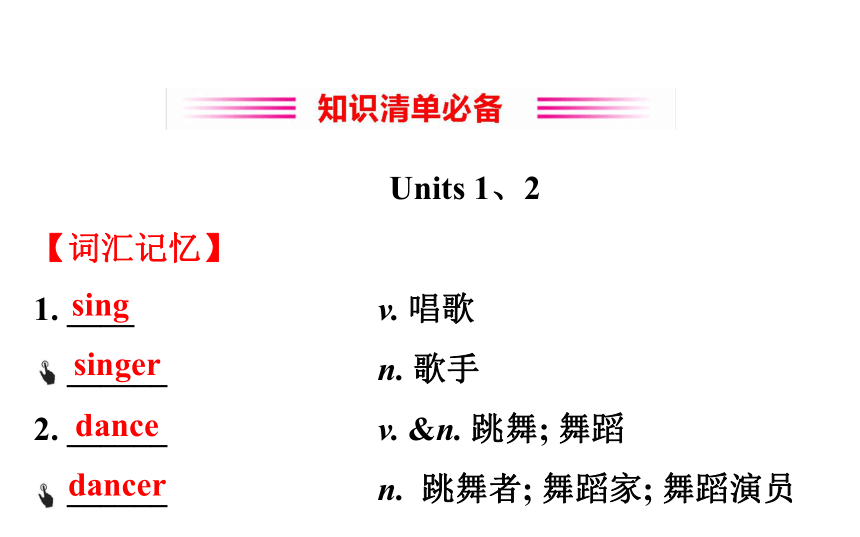
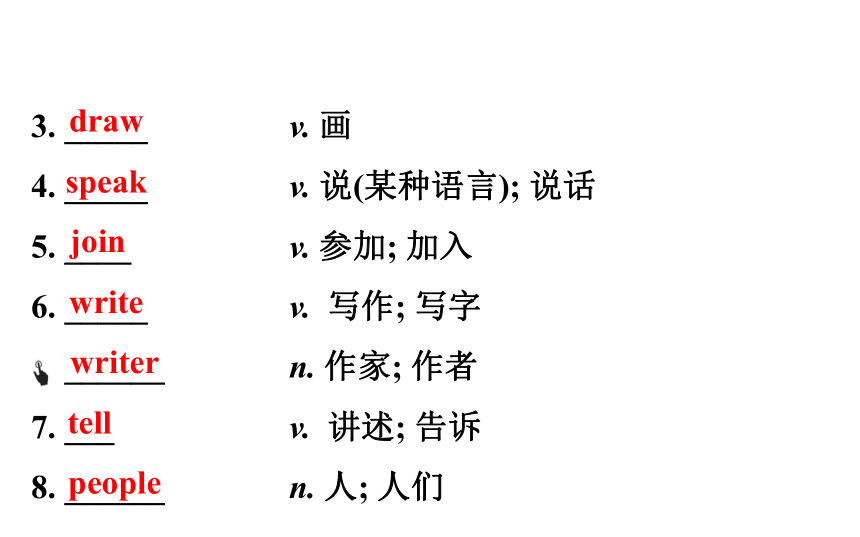
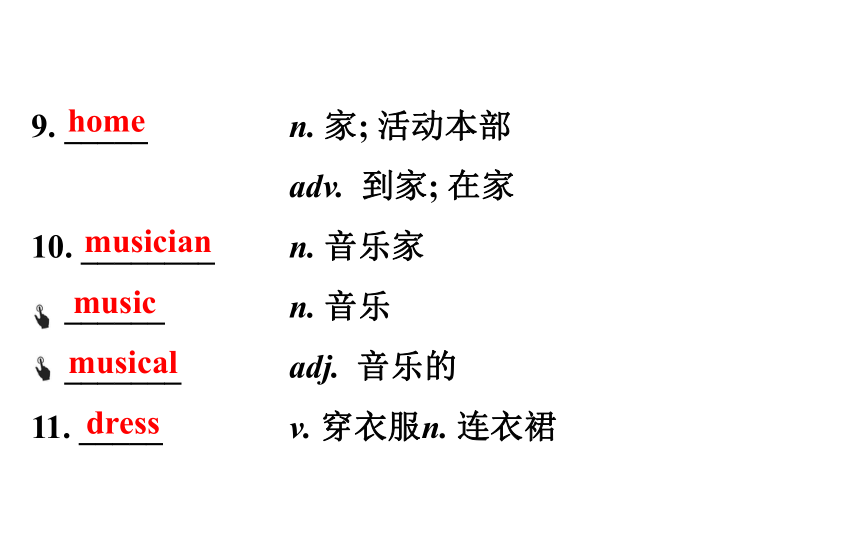
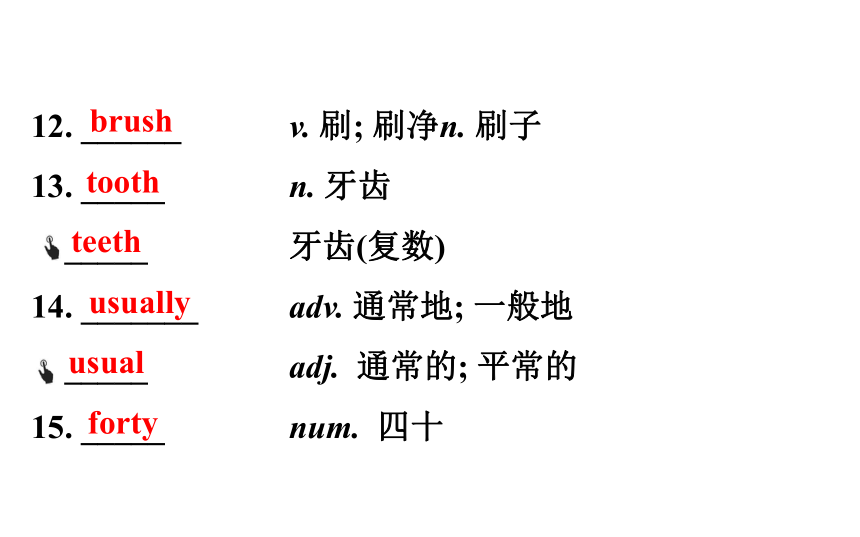
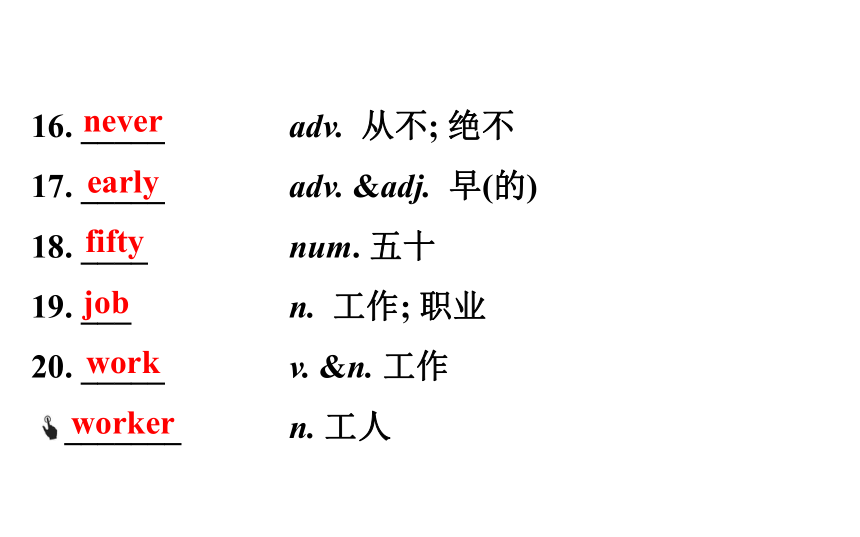
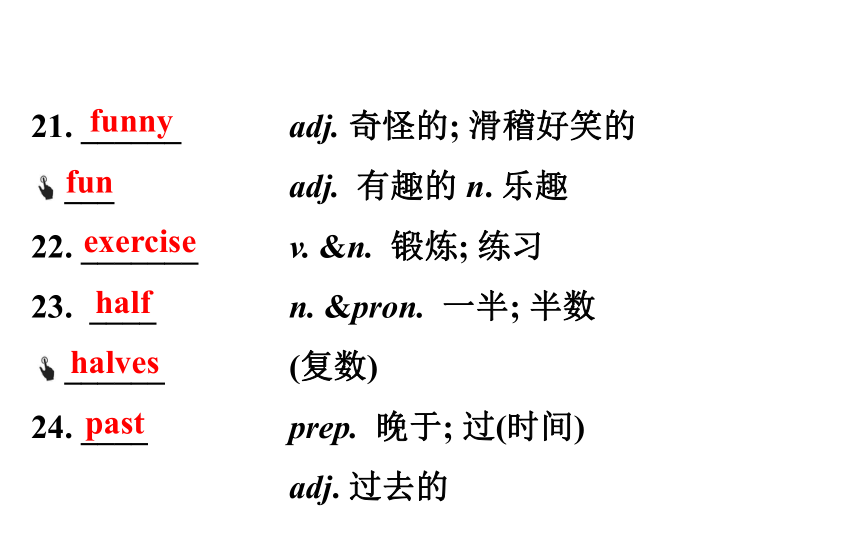
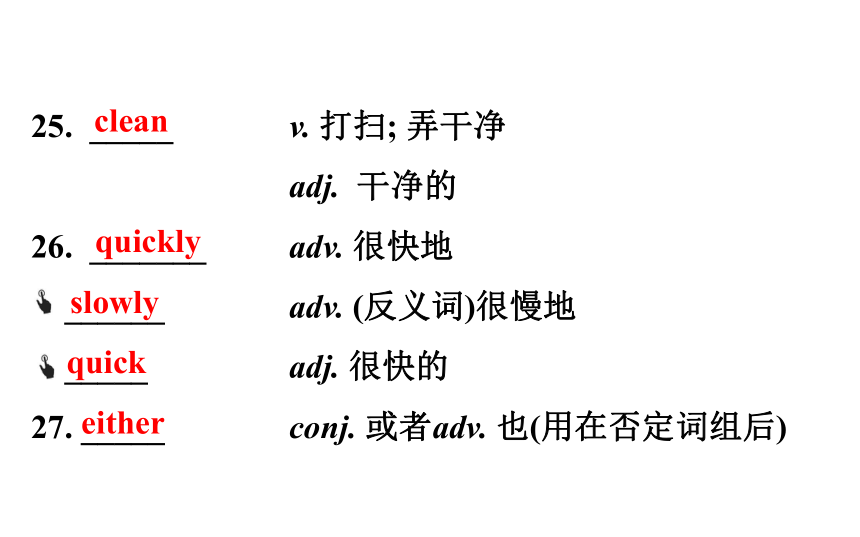
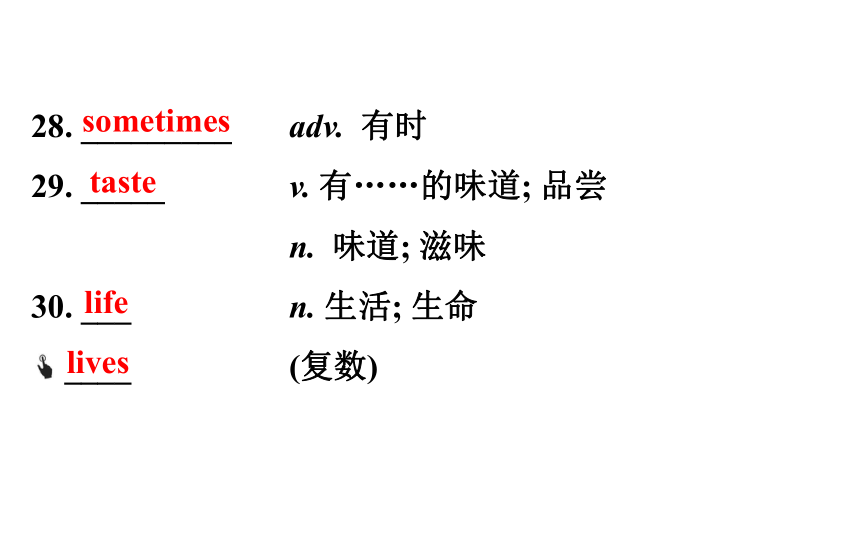
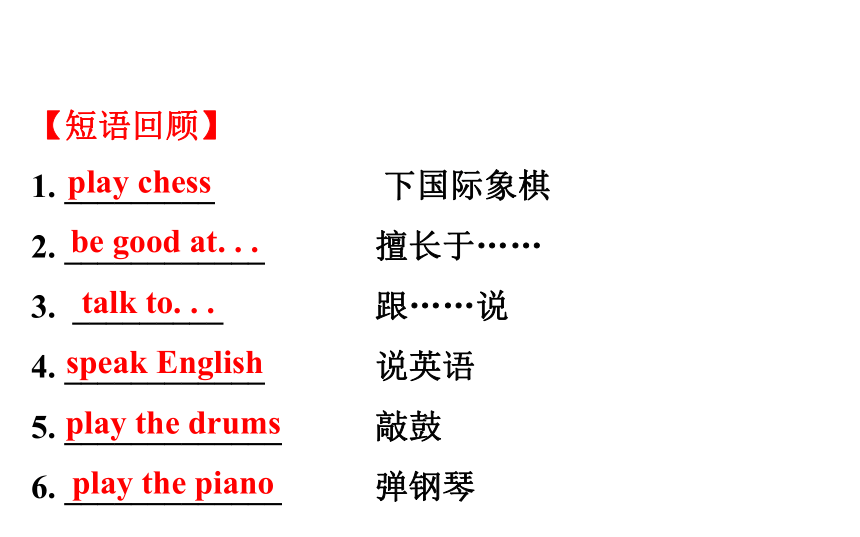
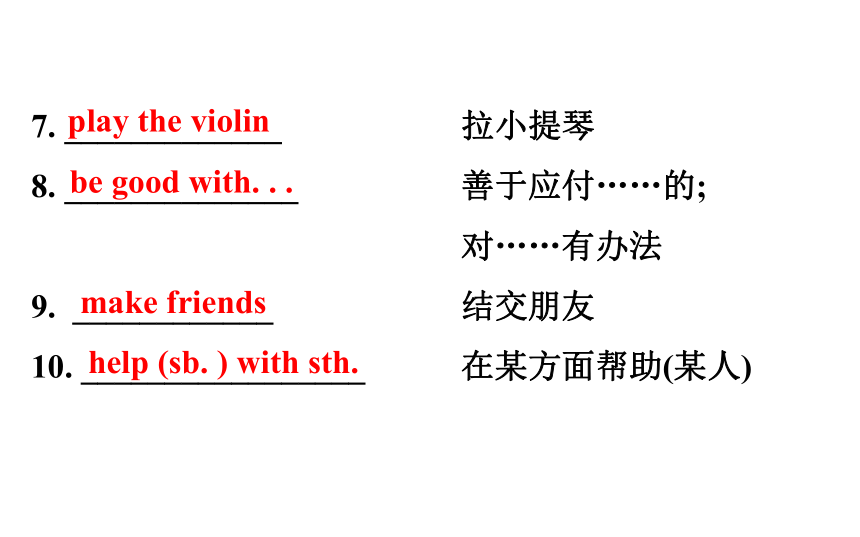
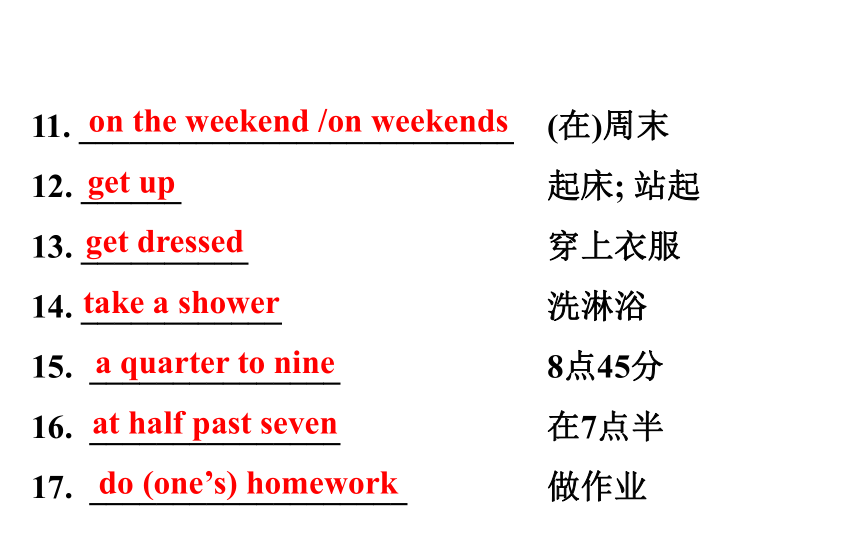
文档简介
七年级下册
Units 1~4
Units 1、2
【词汇记忆】
1. ____ v. 唱歌
______ n. 歌手
2. ______ v. &n. 跳舞; 舞蹈
______ n. 跳舞者; 舞蹈家; 舞蹈演员
singer
dance
sing
dancer
3. _____ v. 画
4. _____ v. 说(某种语言); 说话
5. ____ v. 参加; 加入
6. _____ v. 写作; 写字
______ n. 作家; 作者
7. ___ v. 讲述; 告诉
8. ______ n. 人; 人们
draw
speak
join
write
writer
tell
people
9. _____ n. 家; 活动本部
adv. 到家; 在家
10. ________ n. 音乐家
______ n. 音乐
_______ adj. 音乐的
11. _____ v. 穿衣服n. 连衣裙
home
musician
music
musical
dress
12. ______ v. 刷; 刷净n. 刷子
13. _____ n. 牙齿
_____ 牙齿(复数)
14. _______ adv. 通常地; 一般地
_____ adj. 通常的; 平常的
15. _____ num. 四十
brush
tooth
teeth
usually
usual
forty
16. _____ adv. 从不; 绝不
17. _____ adv. &adj. 早(的)
18. ____ num. 五十
19. ___ n. 工作; 职业
20. _____ v. &n. 工作
_______ n. 工人
never
early
fifty
job
work
worker
21. ______ adj. 奇怪的; 滑稽好笑的
___ adj. 有趣的 n. 乐趣
22. _______ v. &n. 锻炼; 练习
23. ____ n. &pron. 一半; 半数
______ (复数)
24. ____ prep. 晚于; 过(时间)
adj. 过去的
funny
fun
exercise
half
halves
past
25. _____ v. 打扫; 弄干净
adj. 干净的
26. _______ adv. 很快地
______ adv. (反义词)很慢地
_____ adj. 很快的
27. _____ conj. 或者adv. 也(用在否定词组后)
clean
quickly
slowly
quick
either
28. _________ adv. 有时
29. _____ v. 有……的味道; 品尝
n. 味道; 滋味
30. ___ n. 生活; 生命
____ (复数)
sometimes
taste
life
lives
【短语回顾】
1. _________ 下国际象棋?
2. ____________ 擅长于……?
3. _________ 跟……说?
4. ____________ 说英语?
5. _____________ 敲鼓?
6. _____________ 弹钢琴?
play chess
be good at. . .
talk to. . .
speak English
play the drums
play the piano
7. _____________ 拉小提琴?
8. ______________ 善于应付……的; ?
对……有办法
9. ____________? 结交朋友?
10. _________________ 在某方面帮助(某人)?
play the violin?
be good with. . .
make friends
help (sb. ) with sth.
11. __________________________ (在)周末?
12. ______ 起床; 站起?
13. __________ 穿上衣服?
14. ____________ 洗淋浴?
15. _______________? 8点45分?
16. _______________ 在7点半?
17. ___________________ 做作业?
on the weekend /on weekends
get up
get dressed
take a shower
a quarter to nine
at half past seven
do (one’s) homework
18. __________ 散步; 走一走?
19. __________ 或者……或者?
20. ______ 大量; 许多?
take a walk
either. . . or
lots of?
【句式填写】
1. ——你会游泳吗?
—_____________? ?
——是的, 我会。/不, 我不会。
—_________. /__________. ?
Can you swim
Yes, I can
No, I can’t
2. ——你们想参加什么俱乐部?
—_____ ____ ___ you want __ ____? ?
——我们想参加国际象棋俱乐部。
—We want __ ____the _____ ____.
What
club
do
to
join
to
join
chess
club
3. 你会唱歌和跳舞吗?
____you sing ____dance?
4. ——你通常几点起床?
—_____ ____ ___you usually get up?
——我通常在六点三十分起床。
—I usually get up __ ___ _____.
Can
and
What
time
do
at
six
thirty
5. ——斯科特什么时候去上班?
—______ ____ Scott ___ to work?
——他总是在11点去上班。他从不迟到。
—He always ____to work __ ______o’clock. He’s _____
late.
When
does
go
goes
at
eleven
never
6. ——你的朋友们什么时候锻炼身体?
—______ ___ your friends _______?
——他们通常在周末锻炼。
—They usually________ ___ _________.
When
do
exercise
exercise
on
weekends
Units 3、4
【词汇记忆】
1. _____ n. 火车
2. ____ n. 公共汽车
3. ____ v. 骑n. 旅程
4. ______? num. 八十
5. ______? num. 九十
train
bus
ride
eighty
ninety
6. ________ num. 一百
7. _______ n. 分钟
8. _____ v. 横过; 跨越
______ adv. & prep. 过; 穿过
9. ______? n. 村庄; 村镇
_______ n. 村民
hundred
minute
cross
across
village
villager
10. ______? n. 桥
11. ______ adj. 害怕; 畏惧
12. ____ prep. 像; 怎么样
13. _____ v. 离开; 留下
___? (过去式)
___? (过去分词)
14. ______ n. 梦想; 睡梦 v. 做梦
bridge
afraid
like
leave
left
left
dream
15. ____ adj. 真的; 符合事实的?
_____ adv. 真诚地; 真正
_____ n. 事实; 真相
16. ____ n. 规则; 规章
_____ n. 尺子; 统治者
17. ______ v. 到达
18. _____ v. &n. 打架; 战斗
true
truly
truth
rule
ruler
arrive
fight
19. _____? v. 穿; 戴
_____ (过去式)
_____ (过去分词)
20. _________? adj. 重要的?
___________? adj. (反义词)不重要的
__________ n. 重要
wear
wore
worn
important
unimportant
importance
21. _____ v. 带来; 取来
_______________ (过去式/过去分词)?
22. _____ adj. 安静的
______ adv. 安静地
23. _______ v. & n. 练习
24. _____ adj. 脏的
bring
brought/brought
quiet
quietly
practice
dirty
25. _______ n. 厨房
26. _____ adj. 吵闹的
______ adv. 嘈杂地; 吵闹地
_____ n. 嘈杂声
27. _____ v. 放松; 休息?
_______ adj. 令人放松的
_______? adj. 轻松的; 自在的
kitchen
noisy
noisily
noise
relax
relaxing
relaxed
28. _______ adj. 非常讨厌的; 可怕的?
_______ adv. 非常糟糕地; 可怕地
29. _________ v. 记住; 记起
30. ____ n. 幸运; 运气
_____ adj. 幸运的
______ adv. 幸运地; 好运地
_______ adj. 不幸的; 倒霉的
terrible
terribly
remember
luck
lucky
luckily
unlucky
【短语回顾】
1. _________________ 到达?
2. ______________ 乘地铁?
3. ________________ 骑自行车?
4. __________ 开车?
5. ___________ 每天?
6. _______ 认为; 想起?
get to /arrive at(in)
take the subway
ride a bike/by bike
drive a car
every day
think of
7. ________________ 在……和……之间?
8. _________ 实现; 成为现实?
9. ___________ 准时?
10. __________ 听……?
11. _______? 必须; 不得不?
12. ______ 外出(娱乐)?
between. . . and. . .
come true
(be) on time
listen to. . .
have to
go out
13. ____________ 清洗餐具?
14. ______________? 铺床?
15. ________________ (对某人)要求严格?
16. ______________ 遵守规则?
do the dishes
make one’s bed
be strict (with sb. )
follow the rules
【句式填写】
1. ——她怎样到学校?
—_____ ____she ___ __school?
——她通常乘公共汽车。
—She usually _____ ___ ____. ?
How
does
get
to
takes
the
bus
2. ——到学校花费多长时间?
—_____ ____ ____ __ ____ to get to school? ?
——花费大约15分钟。
—__ _____ about 15 minutes.
How
long
does
it
take
It
takes
3. ——从你家到学校有多远?
—_____ ___ __ __ from your home to school?
——大约只有两千米。
—___ only about two kilometers.
4. 对许多学生来说, 上学是容易的。
____many students, __ __ easy _____to school. ?
How
far
is
it
It’s
For
it
is
to get
5. 拥有一座桥是他们的梦想。
__is their dream___ _____ __ ______.
6. 不要在课堂上吃东西。
_____ ___in class.
It
to
have
a
bridge
Don’t
eat
7. ——他必须在学校穿校服吗?
—_____he _____ __ _____a uniform at school?
——是的, 必须穿。/不, 不必穿。
—____________/_____________. ?
Does
have
to
wear
Yes, he does.
No, he doesn’t
1. You’re very good at telling stories. 你非常擅长讲故事。(Unit 1, P2)?
? be good at. . . 擅长于……
【测考点】
(1) (2018·徐州中考) My cousin is good at _______
(dance).
(2)(2018·邵阳中考) They hope the new materials are
both comfortable and ________(对……有好处) the
earth. ?
dancing
good for
(3)我擅长与孩子们打交道。
I’m _____ ____ children.
(4)(2019·宿迁中考) 王俊凯擅长唱歌和打篮球。
Wang Junkai ____________________singing and
playing basketball. ?
good
with
is good at/ does well in
【辨不同】be good短语辨析
be good
at. . .
“擅长于……”, 相当于do well in, at后接名词、代词或v. -ing形式
be good
with. . .
“善于应付……的; 对……有办法”, 其同义短语为get on well with
be good
for. . .
“对……有好处”, 其反义短语为be bad for, 意为“对……有害; 对……有坏处”
2. Please talk to Mr Zhang after school. 请放学后跟张老师说。(Unit 1, P3)?
? talk to. . . 跟……说
【测考点】
( )(1)My parents always_________ me to eat more
vegetables ?and fruit.
A. say B. tell C. speak D. talk
B
(2)用speak, tell, talk, say填空, 补全对话。
—May I _____to Mary? .
—Sure. What do you want to ___?
—I want to ___her to attend the meeting. She’d better
_____English.
—Great! I’ll ____with her about this.
—Thanks.
speak
say
tell
speak
talk
(3)你最好跟你父母谈谈这事。
You’d better ____ _______ your parents about this.
talk
to/with
【辨不同】 speak, tell, talk, say “说法”不同
speak
作不及物动词时, 通常指说话的能力和方式; 作及物动词时, 其后的宾语接某种语言的词
tell
意为“讲述; 告诉”, 作及物动词时, 后常接双宾语即tell sb. sth. 或复合宾语即tell sb. to do sth.
talk
指相互之间的谈话, 一般用作不及物动词, 与介词to或with连用, 表示“与……交谈”。谈及某人或某事时, 后接of或about
say
强调说话的内容, 也可与to连用, say to sb. 意为“对某人说”
3. At eleven o’clock, so I’m never late for work. 在十一点, 所以我上班从不迟到。(Unit 2, P8)
?work n. &v. 工作
【测考点】
( )(1)(2018·日照中考) It’s an easy _________, but
it needs great care. ?
A. idea B. message
C. job D. work
C
(2)用work, job的适当形式完成句子。
My father got a ___in this city. It’s hard _____but he
always ______hard.
(3)我的电脑坏了(不运转了)。
My computer _______ _____.
job
work
works
doesn’t
work
【辨不同】 work与job不一样的“工作”
work
作名词时, 是不可数名词, 通常指日常生活或工作中的各类工作。还可用作动词
job
为可数名词。通常指为了谋生而做的具体的“工作; 职业”
4. I don’t have much time for breakfast, so I usually eat very quickly. 我没有很多时间吃早饭, 因此我通常吃得很快。(Unit 2, P11)
? quickly adv. 很快地
【测考点】
(1)The manager stood at the gate of the hotel and met
every guest _______(polite) with a smile on his face.
(2)People use the Internet ______(wide) in our country
today.
politely
widely
(3) The naughty boy stood there ______(quiet) and
looked at his mother.
(4)As China continues developing _______(quick), the
Chinese language becomes more popular than before.
quietly
quickly
【巧归纳】
很多形容词加后缀-ly可变成相应的副词:
usual(通常的) →usually(通常地)
polite(礼貌的) →politely(礼貌地)
real (真的)→really(真地)
easy(容易的)→ easily(容易地)
true(真的) →truly(真地)
5. In the evening, I either watch TV or play computer games. 在晚上, 我或者看电视或者玩电脑游戏。
(Unit 2, P11)
?either conj. 或者 adv. 也(用在否定句中)
【测考点】
( )(1)(2018·齐齐哈尔中考)—How do you like the
two pairs of shoes?
— They don’t fit me. They are _________too big
_________too small. ?
A. not only; but also B. neither; nor
C. either; or .
C
( )(2)(2018·龙东中考)—When shall we go to the
movies, this afternoon or tomorrow morning?
—_________ is OK. I’m free these days. ?
A. Either B. Neither C. Both
A
( )(3)(2019·天水中考)Either the students or the
teacher_________him very well. ?
A. knows B. to know C. know D. knew
(4)——我不喜欢垃圾食品。——哦, 我也不喜欢。
—I don’t like junk food.
—Oh, I don’t like it, _____.
A
either
【巧归纳】either的三种用法
*If you don’t go, I shall not either.
如果你不去, 我也不去。
*—Would you like the blue one or the green one? 你愿
意要蓝色的还是绿色的?
—Either is OK. 两者任一都可以。
*Ms Brown is either in the office or in the library. 布朗
女士要么在办公室里要么在图书馆里。
6. How long does it take you to get to school? 到达学校花费你多长时间? (Unit 3, P14)
?take v. 花费; 耗费(时间等)
【测考点】
( )(1)The workers _________five days finishing
the hard work. ?
A. paid B. took C. spent D. cost
C
( ) (2)(2019·临沂中考) Roy works in London. It_________ him about half an hour to get to work by
bus every day. ?
A. costs B. spends C. takes
C
( )(3)(2018·新疆中考)—Wow, your sweater is
very beautiful! How much is it?
—Thank you. It _________me 30 dollars. ?
A. spent B. paid C. cost D. took
C
(4)This notebook ____him 20 yuan. (改为同义句)
① He _____20 yuan in buying /on this notebook.
②He ____20 yuan for this notebook.
cost
spent
paid
【辨不同】
take, spend, pay, cost教你合理“花费”
take
常见用法: It takes sb. +时间+to do sth. “做某事花了某人多少时间”
spend
常用结构为“人+spend+ time/money +on sth. / (in) doing sth. ”意为“某人在……上花费时间/金钱”
pay
常用结构为“人+pay +money +for sth. ”“付钱(买某物)”
cost
常用结构为“物 +cost (sb. ) +金钱”, 意为“某物花(某人)多少钱”
7. For many students, it is easy to get to school. 对许多学生来说, 到校很容易。(Unit 3, P17)?
?It’s +adj. +(for sb. ) to do sth. (对某人来说)做……是……的
【测考点】
(1)对于孩子们来说, 穿过繁忙的街道很危险。
__________________________________________
_______
It’s very dangerous for children to cross the busy
street. ?
( )(2)(2019·凉山中考) —Is it necessary
_________us_________some photos before saving the
old man? ?
—Yes, it is. We can protect ourselves if we do so.
A. of; taking B. for; taking
C. of; to take D. for; to take
D
( ) (3)It’s very kind _________you to lend me your
reusable shopping bags. .?
A. of B. for C. to D. with
A
【辨不同】
It’s+adj. +for sb. to do sth. /It’s +adj. +of sb. to do sth.
8. Many of the students and villagers never leave the village. 许多学生和村民从没离开过这个村子。(Unit 3, P17)
? many adj. & pron. 许多
【测考点】
用many, much, a lot of填空。
(1)How _____bananas do you want?
(2)How _____fruit would you like to buy?
(3)There are ____________eggs in the basket. ?
many
much
many/a lot of
(4)There is ____________milk in the glass. ?
(5)I was ill yesterday. But I feel _____better now.
much/a lot of
much
【辨不同】many与much“许多”不同
many
修饰或代替复数可数名词
much
修饰或代替不可数名词
注意: a lot of=lots of既可修饰可数名词, 又能修饰不可数名词。
Though I don’t have much money, I have many/lots of friends. 尽管我没有多少钱, 但我有很多朋友。
【警示】much还可修饰比较级, 表示程度。
9. Don’t arrive late for class. 不准上课迟到。(Unit 4, P19)
? arrive v. 到达
【测考点】
(1)(2017·宿迁中考)I will send you a text message when
I _____(arrive at) the hotel.
( )(2)(2018·孝感中考) With the help of the
Internet, information can _________every corner of
the world quickly. ?
A. get B. raise C. reach D. turn
reach
C
(3)当我们到达山顶时, 我们会发现吸入空气很困难。
When we __________________the top of the mountain,
we’ll find it hard to take in the air. ?
reach/get to/arrive at
【辨不同】 “到达方式”的不同
词汇
相同点
不同点
get
+ 地点副词
(here/there/home)
+ to + 地点
reach
+ 地点
arrive
+ at + 小地点
+ in + 大地点
10. And we always have to wear the school uniform. 而且我们总是得穿校服。(Unit 4, P20)
?wear v. 穿; 戴
【测考点】
(1)选词填空。
.
①He ______his hat and went out quickly. ?
②She likes to _____skirts in summer.
③My sister is able to _____herself now.
wear, put on, dress
put on
wear
dress
( )(2)You’d better _________your coat; it’s very
cold outside. ?
A. wear B. put on
C. dress
B
( )(3)As a teacher, I really feel worried to see so
many students _________glasses. ?
A. wearing
B. dressing
C. putting on
D. being in
A
【辨不同】
wear/dress/put on/be in
wear
穿着; 戴着
强调状态, 宾语可为服装、 鞋帽、 饰物、 奖章等
dress
给……穿衣
表示动作或状态, 宾语通常是人: dress sb. “给某人穿衣服” (动作); dress oneself 给自己穿衣服; be/get dressed in. . . “穿着……”(状态)
put on
穿上; 戴上
强调动作, 宾语通常是衣服、 鞋帽; 宾语若是代词必须放在put和on之间; 反义词组是take off
be in
穿着
后接衣服、 帽子等, 此时可以和wear或have on互换; 其后也可以接颜色。不能用于进行时态
11. Parents and schools are sometimes strict, but remember, they make rules to help us.
父母和学校有时(要求)严格, 但是记住, 他们制定规则是为了帮助我们。(Unit 4, P23)
?strict adj. 严格的; 严厉的 remember v. 记住; 记起
【测考点】
( ) (1)—We must be strict _________ourselves. —I
think so. ?
A. with B. on C. in D. by
A
( )(2)Our teachers _________us and they
_________their work very much. .?
A. be strict with; are strict in
B. are strict in; be strict with
C. are strict with; are strict in
D. be strict in; are strict with
C
( )(3)(2018·邵阳中考) Remember _________some
fruit when you come back. ?
A. buying B. to buy C. buy
( )(4)I remember _________in a small village
when I was a child. .?
A. live B. to live C. living D. lived
B
C
【巧归纳】
(1)strict的两种搭配:
①be strict with sb. “对某人要求严格”;
②be strict in sth. “在某事上严格要求”。
【一言辨异】Mr Smith is strict with us and he is also strict in his work. 史密斯先生对我们很严格, 他对工作也要求严格。
(2)remember的两短语:
①remember doing sth. “记得做过某事”;
②remember to do sth. “记得去做某事”。
【一言辨异】
—Please remember to hand in your homework.
请记住交上作业。
—I remember handing it in . 我记得交上它了。
语法点一 情态动词can的用法
→见语法精讲强化篇P195
考点1: 情态动词can的含义: ①表示能力②表示许可
或请求③表示推测可能性。
考点2: 含情态动词can的基本句式:
①肯定句: 主语+can+动词原形
②否定句: 主语+can+not+动词原形
③一般疑问句: Can+主语+. . . ?
【即时冲关】
( )1. —It’s said that nuclear power will be used to
produce electricity in our city.
—However, nuclear power _________be dangerous. ?
A. can B. need C. must D. should
A
( )2. I have traveled a lot. I _________speak
several languages. .?
A. need B. may C. must D. can
D
( )3. —We have bought too much food. I
_________eat any more. .?
—Never mind. Let’s take it home.
A. needn’t B. mustn’t
C. can’t D. shouldn’t
C
( )4. —_________ you tell me the differences
between these pictures? ?
—No. They look the same.
A. Can B. May C. Must D. Should
A
( )5. —I wonder whether these are David’s glasses.
—They _________be David’s. He doesn’t wear
glasses. ?
A. can B. can’t
C. must D. mustn’t
B
语法点二 祈使句
→见语法精讲强化篇P209
考点1: 祈使句的肯定和否定基本构成:
(1)Do 型: 动词原形(+宾语)+ 其他成分
→Don’t +动词原形(+宾语)+ 其他成分。
(2)Be 型: Be+表语(名词或形容词)+其他成分
→Don’t be+表语(名词或形容词)+其他成分。
(3)Let 型: Let+宾语+动词原形+其他成分
→①Let+宾语+not+动词原形+其他成分。
②Don’t+let+宾语+动词原形+其他成分。
考点2: 祈使句的反意疑问句。
【即时冲关】
( )1. Children, _________ learning and have a
great time. ?
A. keep B. to keep C. keeping D. kept
A
( )2. Look at the road sign. _________carefully,
please! ?
A. Drive B. To drive
C. Driving D. Drove
A
( )3. Tom, _________make trouble at school. ?
A. can’t B. don’t C. doesn’t D. isn’t
( )4. Wait for me at the bus station, _________? ?
A. don’t you B. aren’t you
C. will you D. do you
B
C
( )5. Let’s go shopping this afternoon,
_________? ?
A. will you B. won’t you
C. shall we D. shouldn’t we
C
语法点三 how/how far/how long/what time/
when引导的特殊疑问句
→见语法精讲强化篇P207
考点1: how的常见用法: ①用于询问身体、工作等情
况②用于询问方式、手段③用于询问天气④用
于询问对某事的看法。
考点2: how far用于询问距离。
考点3: how long的两种用法: ①询问时间“多久”②询问
物品的长度“多长”。
考点4: what time用来询问具体的时间点, 可与when替
换。
考点5: when用来询问年、月、日等时间段, 也可以询
问时间点。
【即时冲关】
对画线部分提问。
1. I have stayed in this city for more than five years. ?
_____ ____ have you stayed in this city?
2. It is about 15 minutes’ ride from my home to
school. ?
_____ ___ is it from your home to school?
How
long
How
far
3. I study for an English test by working with my
friends. ?
_____ ___ you study for an English test?
4. My mother usually goes to work at 7: 00. ?
_____ ____ ____ your mother usually go to work?
How
do
What
time
does
5. The 2022 Winter Olympic Games will be held in
Beijing in February. ?
______will the 2022 Winter Olympic Games be held in
Beijing?
When
话题——规则
考查角度
1. 学校规则, 包括对校规校纪及班级公约的认识及建议。
2. 交通规则: 对乱穿马路等现象的看法。
3. 介绍生活中的行为规范, 并谈谈对行为规范的看法。
4. 面对不同的行为准则, 知道该做什么, 不该做什么, 树立正确的价值观。
考查频次
★★★★★
【写作佳句】
亮点句式
1. There are a lot of rules in our school. ?
在我们学校有许多规章制度。
2. We have to wear school uniforms at school. ?
在学校里我们必须得穿校服。
3. I am not allowed to go out and play with friends on school days. 在上学期间, 我不被允许和朋友出去玩。?
4. In my opinion, we should prevent students from wasting water. 在我看来, 我们应该阻止学生浪费水。?
万能句式
1. Every brave man is a man of his word.
勇敢的人都是信守诺言的人。
2. No rules, all things will not be long.
凡事没有规矩, 必不长远。
【典题研析】
树立自我保护意识, 健康快乐地成长是每个青少年
的必修课, 下面是某地关心下一代工作委员会为青少年
编写的《青少年自我保护、健康成长手册》的部分内
容。作为一名中学生, 写一篇文章, 内容包括: ①陈述你
是怎样践行手册中提及的三条事项的; ②补充至少一条
你认为重要的其他事项。
要求: 1. 语言通顺, 要点齐全, 意思连贯, 条理清楚, 书写规范。
2. 文中不得出现真实的姓名和学校名称。
3. 词数: 80~100个, 文章开头和结尾已给出, 不计入总词数。
Self-protection is one of the most important skills
for teenagers. But how do I protect myself and grow up
healthily? Now let me share my experience and ideas
with you. ?
First, I always obey the traffic rules. ?
__________________________________________
______________________________________________
In short, if we obey the rules and take care of
ourselves, we will grow up safely and healthily. ?
Step 1?“四定”审题
(1)定文体: _______
(2)定人称: 以_________为主。
(3)定时态: 以___________为主。
(4)定要点: ①自我保护的重要性; ②交通安全; ③食品
安全; ④交友安全; ⑤其他安全, 如用电安全、防溺水、
防火等。
说明文
第一人称
一般现在时
Step 2?段落谋篇
第一段: 点明主题, 说明自我保护的重要性。
自我保护对青少年来说是最重要的技能之一。(one of)
______________________________________________
_________?
Self-protection is one of the most important skills for
teenagers.
第二段: 分层介绍自我保护的措施。
1. 遵守交通规则, 不闯红灯(obey the traffic rules)
______________________________________________
_____?
2. 健康安全地饮食很重要(It’s +adj. + to do sth. );
____________________________________
I always obey the traffic rules and I never run the red
light.
It’s important to eat healthily and safely. ?
3. 不独自去见陌生人(alone)
_________________________?
4. 独自游泳很危险。
_________________________?
I never meet strangers alone.
It’s dangerous to swim alone.
第三段: 总述遵守规则, 保护自己。
只要遵守规则, 照顾好自己, 就能健康安全地成长(obey,
take care of)
____________________________________________
______________________________
If we obey the rules and take care of ourselves, we
will grow up safely and healthily. ?
Step 3?润色成篇
_________________________________________
_________________________________________
Units 1~4
Units 1、2
【词汇记忆】
1. ____ v. 唱歌
______ n. 歌手
2. ______ v. &n. 跳舞; 舞蹈
______ n. 跳舞者; 舞蹈家; 舞蹈演员
singer
dance
sing
dancer
3. _____ v. 画
4. _____ v. 说(某种语言); 说话
5. ____ v. 参加; 加入
6. _____ v. 写作; 写字
______ n. 作家; 作者
7. ___ v. 讲述; 告诉
8. ______ n. 人; 人们
draw
speak
join
write
writer
tell
people
9. _____ n. 家; 活动本部
adv. 到家; 在家
10. ________ n. 音乐家
______ n. 音乐
_______ adj. 音乐的
11. _____ v. 穿衣服n. 连衣裙
home
musician
music
musical
dress
12. ______ v. 刷; 刷净n. 刷子
13. _____ n. 牙齿
_____ 牙齿(复数)
14. _______ adv. 通常地; 一般地
_____ adj. 通常的; 平常的
15. _____ num. 四十
brush
tooth
teeth
usually
usual
forty
16. _____ adv. 从不; 绝不
17. _____ adv. &adj. 早(的)
18. ____ num. 五十
19. ___ n. 工作; 职业
20. _____ v. &n. 工作
_______ n. 工人
never
early
fifty
job
work
worker
21. ______ adj. 奇怪的; 滑稽好笑的
___ adj. 有趣的 n. 乐趣
22. _______ v. &n. 锻炼; 练习
23. ____ n. &pron. 一半; 半数
______ (复数)
24. ____ prep. 晚于; 过(时间)
adj. 过去的
funny
fun
exercise
half
halves
past
25. _____ v. 打扫; 弄干净
adj. 干净的
26. _______ adv. 很快地
______ adv. (反义词)很慢地
_____ adj. 很快的
27. _____ conj. 或者adv. 也(用在否定词组后)
clean
quickly
slowly
quick
either
28. _________ adv. 有时
29. _____ v. 有……的味道; 品尝
n. 味道; 滋味
30. ___ n. 生活; 生命
____ (复数)
sometimes
taste
life
lives
【短语回顾】
1. _________ 下国际象棋?
2. ____________ 擅长于……?
3. _________ 跟……说?
4. ____________ 说英语?
5. _____________ 敲鼓?
6. _____________ 弹钢琴?
play chess
be good at. . .
talk to. . .
speak English
play the drums
play the piano
7. _____________ 拉小提琴?
8. ______________ 善于应付……的; ?
对……有办法
9. ____________? 结交朋友?
10. _________________ 在某方面帮助(某人)?
play the violin?
be good with. . .
make friends
help (sb. ) with sth.
11. __________________________ (在)周末?
12. ______ 起床; 站起?
13. __________ 穿上衣服?
14. ____________ 洗淋浴?
15. _______________? 8点45分?
16. _______________ 在7点半?
17. ___________________ 做作业?
on the weekend /on weekends
get up
get dressed
take a shower
a quarter to nine
at half past seven
do (one’s) homework
18. __________ 散步; 走一走?
19. __________ 或者……或者?
20. ______ 大量; 许多?
take a walk
either. . . or
lots of?
【句式填写】
1. ——你会游泳吗?
—_____________? ?
——是的, 我会。/不, 我不会。
—_________. /__________. ?
Can you swim
Yes, I can
No, I can’t
2. ——你们想参加什么俱乐部?
—_____ ____ ___ you want __ ____? ?
——我们想参加国际象棋俱乐部。
—We want __ ____the _____ ____.
What
club
do
to
join
to
join
chess
club
3. 你会唱歌和跳舞吗?
____you sing ____dance?
4. ——你通常几点起床?
—_____ ____ ___you usually get up?
——我通常在六点三十分起床。
—I usually get up __ ___ _____.
Can
and
What
time
do
at
six
thirty
5. ——斯科特什么时候去上班?
—______ ____ Scott ___ to work?
——他总是在11点去上班。他从不迟到。
—He always ____to work __ ______o’clock. He’s _____
late.
When
does
go
goes
at
eleven
never
6. ——你的朋友们什么时候锻炼身体?
—______ ___ your friends _______?
——他们通常在周末锻炼。
—They usually________ ___ _________.
When
do
exercise
exercise
on
weekends
Units 3、4
【词汇记忆】
1. _____ n. 火车
2. ____ n. 公共汽车
3. ____ v. 骑n. 旅程
4. ______? num. 八十
5. ______? num. 九十
train
bus
ride
eighty
ninety
6. ________ num. 一百
7. _______ n. 分钟
8. _____ v. 横过; 跨越
______ adv. & prep. 过; 穿过
9. ______? n. 村庄; 村镇
_______ n. 村民
hundred
minute
cross
across
village
villager
10. ______? n. 桥
11. ______ adj. 害怕; 畏惧
12. ____ prep. 像; 怎么样
13. _____ v. 离开; 留下
___? (过去式)
___? (过去分词)
14. ______ n. 梦想; 睡梦 v. 做梦
bridge
afraid
like
leave
left
left
dream
15. ____ adj. 真的; 符合事实的?
_____ adv. 真诚地; 真正
_____ n. 事实; 真相
16. ____ n. 规则; 规章
_____ n. 尺子; 统治者
17. ______ v. 到达
18. _____ v. &n. 打架; 战斗
true
truly
truth
rule
ruler
arrive
fight
19. _____? v. 穿; 戴
_____ (过去式)
_____ (过去分词)
20. _________? adj. 重要的?
___________? adj. (反义词)不重要的
__________ n. 重要
wear
wore
worn
important
unimportant
importance
21. _____ v. 带来; 取来
_______________ (过去式/过去分词)?
22. _____ adj. 安静的
______ adv. 安静地
23. _______ v. & n. 练习
24. _____ adj. 脏的
bring
brought/brought
quiet
quietly
practice
dirty
25. _______ n. 厨房
26. _____ adj. 吵闹的
______ adv. 嘈杂地; 吵闹地
_____ n. 嘈杂声
27. _____ v. 放松; 休息?
_______ adj. 令人放松的
_______? adj. 轻松的; 自在的
kitchen
noisy
noisily
noise
relax
relaxing
relaxed
28. _______ adj. 非常讨厌的; 可怕的?
_______ adv. 非常糟糕地; 可怕地
29. _________ v. 记住; 记起
30. ____ n. 幸运; 运气
_____ adj. 幸运的
______ adv. 幸运地; 好运地
_______ adj. 不幸的; 倒霉的
terrible
terribly
remember
luck
lucky
luckily
unlucky
【短语回顾】
1. _________________ 到达?
2. ______________ 乘地铁?
3. ________________ 骑自行车?
4. __________ 开车?
5. ___________ 每天?
6. _______ 认为; 想起?
get to /arrive at(in)
take the subway
ride a bike/by bike
drive a car
every day
think of
7. ________________ 在……和……之间?
8. _________ 实现; 成为现实?
9. ___________ 准时?
10. __________ 听……?
11. _______? 必须; 不得不?
12. ______ 外出(娱乐)?
between. . . and. . .
come true
(be) on time
listen to. . .
have to
go out
13. ____________ 清洗餐具?
14. ______________? 铺床?
15. ________________ (对某人)要求严格?
16. ______________ 遵守规则?
do the dishes
make one’s bed
be strict (with sb. )
follow the rules
【句式填写】
1. ——她怎样到学校?
—_____ ____she ___ __school?
——她通常乘公共汽车。
—She usually _____ ___ ____. ?
How
does
get
to
takes
the
bus
2. ——到学校花费多长时间?
—_____ ____ ____ __ ____ to get to school? ?
——花费大约15分钟。
—__ _____ about 15 minutes.
How
long
does
it
take
It
takes
3. ——从你家到学校有多远?
—_____ ___ __ __ from your home to school?
——大约只有两千米。
—___ only about two kilometers.
4. 对许多学生来说, 上学是容易的。
____many students, __ __ easy _____to school. ?
How
far
is
it
It’s
For
it
is
to get
5. 拥有一座桥是他们的梦想。
__is their dream___ _____ __ ______.
6. 不要在课堂上吃东西。
_____ ___in class.
It
to
have
a
bridge
Don’t
eat
7. ——他必须在学校穿校服吗?
—_____he _____ __ _____a uniform at school?
——是的, 必须穿。/不, 不必穿。
—____________/_____________. ?
Does
have
to
wear
Yes, he does.
No, he doesn’t
1. You’re very good at telling stories. 你非常擅长讲故事。(Unit 1, P2)?
? be good at. . . 擅长于……
【测考点】
(1) (2018·徐州中考) My cousin is good at _______
(dance).
(2)(2018·邵阳中考) They hope the new materials are
both comfortable and ________(对……有好处) the
earth. ?
dancing
good for
(3)我擅长与孩子们打交道。
I’m _____ ____ children.
(4)(2019·宿迁中考) 王俊凯擅长唱歌和打篮球。
Wang Junkai ____________________singing and
playing basketball. ?
good
with
is good at/ does well in
【辨不同】be good短语辨析
be good
at. . .
“擅长于……”, 相当于do well in, at后接名词、代词或v. -ing形式
be good
with. . .
“善于应付……的; 对……有办法”, 其同义短语为get on well with
be good
for. . .
“对……有好处”, 其反义短语为be bad for, 意为“对……有害; 对……有坏处”
2. Please talk to Mr Zhang after school. 请放学后跟张老师说。(Unit 1, P3)?
? talk to. . . 跟……说
【测考点】
( )(1)My parents always_________ me to eat more
vegetables ?and fruit.
A. say B. tell C. speak D. talk
B
(2)用speak, tell, talk, say填空, 补全对话。
—May I _____to Mary? .
—Sure. What do you want to ___?
—I want to ___her to attend the meeting. She’d better
_____English.
—Great! I’ll ____with her about this.
—Thanks.
speak
say
tell
speak
talk
(3)你最好跟你父母谈谈这事。
You’d better ____ _______ your parents about this.
talk
to/with
【辨不同】 speak, tell, talk, say “说法”不同
speak
作不及物动词时, 通常指说话的能力和方式; 作及物动词时, 其后的宾语接某种语言的词
tell
意为“讲述; 告诉”, 作及物动词时, 后常接双宾语即tell sb. sth. 或复合宾语即tell sb. to do sth.
talk
指相互之间的谈话, 一般用作不及物动词, 与介词to或with连用, 表示“与……交谈”。谈及某人或某事时, 后接of或about
say
强调说话的内容, 也可与to连用, say to sb. 意为“对某人说”
3. At eleven o’clock, so I’m never late for work. 在十一点, 所以我上班从不迟到。(Unit 2, P8)
?work n. &v. 工作
【测考点】
( )(1)(2018·日照中考) It’s an easy _________, but
it needs great care. ?
A. idea B. message
C. job D. work
C
(2)用work, job的适当形式完成句子。
My father got a ___in this city. It’s hard _____but he
always ______hard.
(3)我的电脑坏了(不运转了)。
My computer _______ _____.
job
work
works
doesn’t
work
【辨不同】 work与job不一样的“工作”
work
作名词时, 是不可数名词, 通常指日常生活或工作中的各类工作。还可用作动词
job
为可数名词。通常指为了谋生而做的具体的“工作; 职业”
4. I don’t have much time for breakfast, so I usually eat very quickly. 我没有很多时间吃早饭, 因此我通常吃得很快。(Unit 2, P11)
? quickly adv. 很快地
【测考点】
(1)The manager stood at the gate of the hotel and met
every guest _______(polite) with a smile on his face.
(2)People use the Internet ______(wide) in our country
today.
politely
widely
(3) The naughty boy stood there ______(quiet) and
looked at his mother.
(4)As China continues developing _______(quick), the
Chinese language becomes more popular than before.
quietly
quickly
【巧归纳】
很多形容词加后缀-ly可变成相应的副词:
usual(通常的) →usually(通常地)
polite(礼貌的) →politely(礼貌地)
real (真的)→really(真地)
easy(容易的)→ easily(容易地)
true(真的) →truly(真地)
5. In the evening, I either watch TV or play computer games. 在晚上, 我或者看电视或者玩电脑游戏。
(Unit 2, P11)
?either conj. 或者 adv. 也(用在否定句中)
【测考点】
( )(1)(2018·齐齐哈尔中考)—How do you like the
two pairs of shoes?
— They don’t fit me. They are _________too big
_________too small. ?
A. not only; but also B. neither; nor
C. either; or .
C
( )(2)(2018·龙东中考)—When shall we go to the
movies, this afternoon or tomorrow morning?
—_________ is OK. I’m free these days. ?
A. Either B. Neither C. Both
A
( )(3)(2019·天水中考)Either the students or the
teacher_________him very well. ?
A. knows B. to know C. know D. knew
(4)——我不喜欢垃圾食品。——哦, 我也不喜欢。
—I don’t like junk food.
—Oh, I don’t like it, _____.
A
either
【巧归纳】either的三种用法
*If you don’t go, I shall not either.
如果你不去, 我也不去。
*—Would you like the blue one or the green one? 你愿
意要蓝色的还是绿色的?
—Either is OK. 两者任一都可以。
*Ms Brown is either in the office or in the library. 布朗
女士要么在办公室里要么在图书馆里。
6. How long does it take you to get to school? 到达学校花费你多长时间? (Unit 3, P14)
?take v. 花费; 耗费(时间等)
【测考点】
( )(1)The workers _________five days finishing
the hard work. ?
A. paid B. took C. spent D. cost
C
( ) (2)(2019·临沂中考) Roy works in London. It_________ him about half an hour to get to work by
bus every day. ?
A. costs B. spends C. takes
C
( )(3)(2018·新疆中考)—Wow, your sweater is
very beautiful! How much is it?
—Thank you. It _________me 30 dollars. ?
A. spent B. paid C. cost D. took
C
(4)This notebook ____him 20 yuan. (改为同义句)
① He _____20 yuan in buying /on this notebook.
②He ____20 yuan for this notebook.
cost
spent
paid
【辨不同】
take, spend, pay, cost教你合理“花费”
take
常见用法: It takes sb. +时间+to do sth. “做某事花了某人多少时间”
spend
常用结构为“人+spend+ time/money +on sth. / (in) doing sth. ”意为“某人在……上花费时间/金钱”
pay
常用结构为“人+pay +money +for sth. ”“付钱(买某物)”
cost
常用结构为“物 +cost (sb. ) +金钱”, 意为“某物花(某人)多少钱”
7. For many students, it is easy to get to school. 对许多学生来说, 到校很容易。(Unit 3, P17)?
?It’s +adj. +(for sb. ) to do sth. (对某人来说)做……是……的
【测考点】
(1)对于孩子们来说, 穿过繁忙的街道很危险。
__________________________________________
_______
It’s very dangerous for children to cross the busy
street. ?
( )(2)(2019·凉山中考) —Is it necessary
_________us_________some photos before saving the
old man? ?
—Yes, it is. We can protect ourselves if we do so.
A. of; taking B. for; taking
C. of; to take D. for; to take
D
( ) (3)It’s very kind _________you to lend me your
reusable shopping bags. .?
A. of B. for C. to D. with
A
【辨不同】
It’s+adj. +for sb. to do sth. /It’s +adj. +of sb. to do sth.
8. Many of the students and villagers never leave the village. 许多学生和村民从没离开过这个村子。(Unit 3, P17)
? many adj. & pron. 许多
【测考点】
用many, much, a lot of填空。
(1)How _____bananas do you want?
(2)How _____fruit would you like to buy?
(3)There are ____________eggs in the basket. ?
many
much
many/a lot of
(4)There is ____________milk in the glass. ?
(5)I was ill yesterday. But I feel _____better now.
much/a lot of
much
【辨不同】many与much“许多”不同
many
修饰或代替复数可数名词
much
修饰或代替不可数名词
注意: a lot of=lots of既可修饰可数名词, 又能修饰不可数名词。
Though I don’t have much money, I have many/lots of friends. 尽管我没有多少钱, 但我有很多朋友。
【警示】much还可修饰比较级, 表示程度。
9. Don’t arrive late for class. 不准上课迟到。(Unit 4, P19)
? arrive v. 到达
【测考点】
(1)(2017·宿迁中考)I will send you a text message when
I _____(arrive at) the hotel.
( )(2)(2018·孝感中考) With the help of the
Internet, information can _________every corner of
the world quickly. ?
A. get B. raise C. reach D. turn
reach
C
(3)当我们到达山顶时, 我们会发现吸入空气很困难。
When we __________________the top of the mountain,
we’ll find it hard to take in the air. ?
reach/get to/arrive at
【辨不同】 “到达方式”的不同
词汇
相同点
不同点
get
+ 地点副词
(here/there/home)
+ to + 地点
reach
+ 地点
arrive
+ at + 小地点
+ in + 大地点
10. And we always have to wear the school uniform. 而且我们总是得穿校服。(Unit 4, P20)
?wear v. 穿; 戴
【测考点】
(1)选词填空。
.
①He ______his hat and went out quickly. ?
②She likes to _____skirts in summer.
③My sister is able to _____herself now.
wear, put on, dress
put on
wear
dress
( )(2)You’d better _________your coat; it’s very
cold outside. ?
A. wear B. put on
C. dress
B
( )(3)As a teacher, I really feel worried to see so
many students _________glasses. ?
A. wearing
B. dressing
C. putting on
D. being in
A
【辨不同】
wear/dress/put on/be in
wear
穿着; 戴着
强调状态, 宾语可为服装、 鞋帽、 饰物、 奖章等
dress
给……穿衣
表示动作或状态, 宾语通常是人: dress sb. “给某人穿衣服” (动作); dress oneself 给自己穿衣服; be/get dressed in. . . “穿着……”(状态)
put on
穿上; 戴上
强调动作, 宾语通常是衣服、 鞋帽; 宾语若是代词必须放在put和on之间; 反义词组是take off
be in
穿着
后接衣服、 帽子等, 此时可以和wear或have on互换; 其后也可以接颜色。不能用于进行时态
11. Parents and schools are sometimes strict, but remember, they make rules to help us.
父母和学校有时(要求)严格, 但是记住, 他们制定规则是为了帮助我们。(Unit 4, P23)
?strict adj. 严格的; 严厉的 remember v. 记住; 记起
【测考点】
( ) (1)—We must be strict _________ourselves. —I
think so. ?
A. with B. on C. in D. by
A
( )(2)Our teachers _________us and they
_________their work very much. .?
A. be strict with; are strict in
B. are strict in; be strict with
C. are strict with; are strict in
D. be strict in; are strict with
C
( )(3)(2018·邵阳中考) Remember _________some
fruit when you come back. ?
A. buying B. to buy C. buy
( )(4)I remember _________in a small village
when I was a child. .?
A. live B. to live C. living D. lived
B
C
【巧归纳】
(1)strict的两种搭配:
①be strict with sb. “对某人要求严格”;
②be strict in sth. “在某事上严格要求”。
【一言辨异】Mr Smith is strict with us and he is also strict in his work. 史密斯先生对我们很严格, 他对工作也要求严格。
(2)remember的两短语:
①remember doing sth. “记得做过某事”;
②remember to do sth. “记得去做某事”。
【一言辨异】
—Please remember to hand in your homework.
请记住交上作业。
—I remember handing it in . 我记得交上它了。
语法点一 情态动词can的用法
→见语法精讲强化篇P195
考点1: 情态动词can的含义: ①表示能力②表示许可
或请求③表示推测可能性。
考点2: 含情态动词can的基本句式:
①肯定句: 主语+can+动词原形
②否定句: 主语+can+not+动词原形
③一般疑问句: Can+主语+. . . ?
【即时冲关】
( )1. —It’s said that nuclear power will be used to
produce electricity in our city.
—However, nuclear power _________be dangerous. ?
A. can B. need C. must D. should
A
( )2. I have traveled a lot. I _________speak
several languages. .?
A. need B. may C. must D. can
D
( )3. —We have bought too much food. I
_________eat any more. .?
—Never mind. Let’s take it home.
A. needn’t B. mustn’t
C. can’t D. shouldn’t
C
( )4. —_________ you tell me the differences
between these pictures? ?
—No. They look the same.
A. Can B. May C. Must D. Should
A
( )5. —I wonder whether these are David’s glasses.
—They _________be David’s. He doesn’t wear
glasses. ?
A. can B. can’t
C. must D. mustn’t
B
语法点二 祈使句
→见语法精讲强化篇P209
考点1: 祈使句的肯定和否定基本构成:
(1)Do 型: 动词原形(+宾语)+ 其他成分
→Don’t +动词原形(+宾语)+ 其他成分。
(2)Be 型: Be+表语(名词或形容词)+其他成分
→Don’t be+表语(名词或形容词)+其他成分。
(3)Let 型: Let+宾语+动词原形+其他成分
→①Let+宾语+not+动词原形+其他成分。
②Don’t+let+宾语+动词原形+其他成分。
考点2: 祈使句的反意疑问句。
【即时冲关】
( )1. Children, _________ learning and have a
great time. ?
A. keep B. to keep C. keeping D. kept
A
( )2. Look at the road sign. _________carefully,
please! ?
A. Drive B. To drive
C. Driving D. Drove
A
( )3. Tom, _________make trouble at school. ?
A. can’t B. don’t C. doesn’t D. isn’t
( )4. Wait for me at the bus station, _________? ?
A. don’t you B. aren’t you
C. will you D. do you
B
C
( )5. Let’s go shopping this afternoon,
_________? ?
A. will you B. won’t you
C. shall we D. shouldn’t we
C
语法点三 how/how far/how long/what time/
when引导的特殊疑问句
→见语法精讲强化篇P207
考点1: how的常见用法: ①用于询问身体、工作等情
况②用于询问方式、手段③用于询问天气④用
于询问对某事的看法。
考点2: how far用于询问距离。
考点3: how long的两种用法: ①询问时间“多久”②询问
物品的长度“多长”。
考点4: what time用来询问具体的时间点, 可与when替
换。
考点5: when用来询问年、月、日等时间段, 也可以询
问时间点。
【即时冲关】
对画线部分提问。
1. I have stayed in this city for more than five years. ?
_____ ____ have you stayed in this city?
2. It is about 15 minutes’ ride from my home to
school. ?
_____ ___ is it from your home to school?
How
long
How
far
3. I study for an English test by working with my
friends. ?
_____ ___ you study for an English test?
4. My mother usually goes to work at 7: 00. ?
_____ ____ ____ your mother usually go to work?
How
do
What
time
does
5. The 2022 Winter Olympic Games will be held in
Beijing in February. ?
______will the 2022 Winter Olympic Games be held in
Beijing?
When
话题——规则
考查角度
1. 学校规则, 包括对校规校纪及班级公约的认识及建议。
2. 交通规则: 对乱穿马路等现象的看法。
3. 介绍生活中的行为规范, 并谈谈对行为规范的看法。
4. 面对不同的行为准则, 知道该做什么, 不该做什么, 树立正确的价值观。
考查频次
★★★★★
【写作佳句】
亮点句式
1. There are a lot of rules in our school. ?
在我们学校有许多规章制度。
2. We have to wear school uniforms at school. ?
在学校里我们必须得穿校服。
3. I am not allowed to go out and play with friends on school days. 在上学期间, 我不被允许和朋友出去玩。?
4. In my opinion, we should prevent students from wasting water. 在我看来, 我们应该阻止学生浪费水。?
万能句式
1. Every brave man is a man of his word.
勇敢的人都是信守诺言的人。
2. No rules, all things will not be long.
凡事没有规矩, 必不长远。
【典题研析】
树立自我保护意识, 健康快乐地成长是每个青少年
的必修课, 下面是某地关心下一代工作委员会为青少年
编写的《青少年自我保护、健康成长手册》的部分内
容。作为一名中学生, 写一篇文章, 内容包括: ①陈述你
是怎样践行手册中提及的三条事项的; ②补充至少一条
你认为重要的其他事项。
要求: 1. 语言通顺, 要点齐全, 意思连贯, 条理清楚, 书写规范。
2. 文中不得出现真实的姓名和学校名称。
3. 词数: 80~100个, 文章开头和结尾已给出, 不计入总词数。
Self-protection is one of the most important skills
for teenagers. But how do I protect myself and grow up
healthily? Now let me share my experience and ideas
with you. ?
First, I always obey the traffic rules. ?
__________________________________________
______________________________________________
In short, if we obey the rules and take care of
ourselves, we will grow up safely and healthily. ?
Step 1?“四定”审题
(1)定文体: _______
(2)定人称: 以_________为主。
(3)定时态: 以___________为主。
(4)定要点: ①自我保护的重要性; ②交通安全; ③食品
安全; ④交友安全; ⑤其他安全, 如用电安全、防溺水、
防火等。
说明文
第一人称
一般现在时
Step 2?段落谋篇
第一段: 点明主题, 说明自我保护的重要性。
自我保护对青少年来说是最重要的技能之一。(one of)
______________________________________________
_________?
Self-protection is one of the most important skills for
teenagers.
第二段: 分层介绍自我保护的措施。
1. 遵守交通规则, 不闯红灯(obey the traffic rules)
______________________________________________
_____?
2. 健康安全地饮食很重要(It’s +adj. + to do sth. );
____________________________________
I always obey the traffic rules and I never run the red
light.
It’s important to eat healthily and safely. ?
3. 不独自去见陌生人(alone)
_________________________?
4. 独自游泳很危险。
_________________________?
I never meet strangers alone.
It’s dangerous to swim alone.
第三段: 总述遵守规则, 保护自己。
只要遵守规则, 照顾好自己, 就能健康安全地成长(obey,
take care of)
____________________________________________
______________________________
If we obey the rules and take care of ourselves, we
will grow up safely and healthily. ?
Step 3?润色成篇
_________________________________________
_________________________________________
